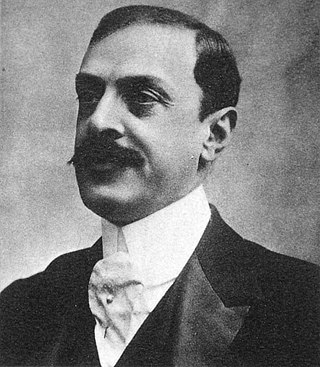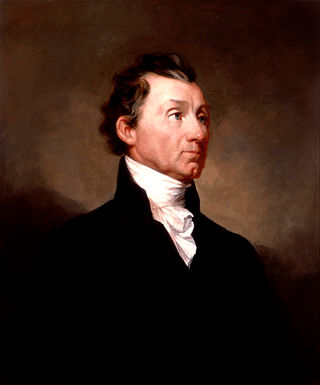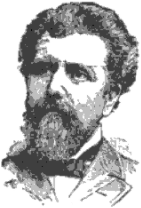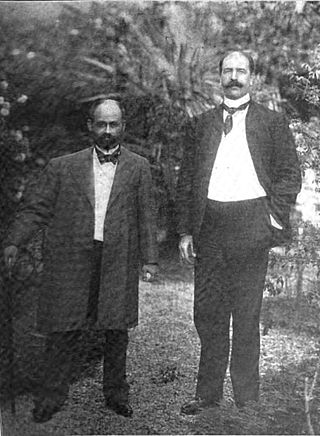Related Research Articles

James Monroe was an American statesman, lawyer, diplomat, and Founding Father who served as the fifth president of the United States from 1817 to 1825, a member of the Democratic-Republican Party. He was the last Founding Father to serve as president as well as the last president of the Virginia dynasty. His presidency coincided with the Era of Good Feelings, concluding the First Party System era of American politics. He issued the Monroe Doctrine, a policy of limiting European colonialism in the Americas. Monroe previously served as governor of Virginia, a member of the United States Senate, U.S. ambassador to France and Britain, the seventh secretary of state, and the eighth secretary of war.

The Drago Doctrine was announced in 1902 by Argentine Minister of Foreign Affairs Luis María Drago in a diplomatic note to the United States. This doctrine stated that simply failing to repay national debt was not a valid reason for foreign intervention, especially by a power outside of the Western Hemisphere. The doctrine was a response to the European powers' blockade of Venezuela, which occurred after the country defaulted on its debt. Washington accepted and used the Drago doctrine. In order to prevent further interventions, the United States took control of the customs of several Latin American countries to ensure debt payments were made to Europe.

In the history of United States foreign policy, the Roosevelt Corollary was an addition to the Monroe Doctrine articulated by President Theodore Roosevelt in his State of the Union address in 1904, largely as a consequence of the Venezuelan crisis of 1902–1903. The corollary states that the United States could intervene in the internal affairs of Latin American countries if they committed flagrant wrongdoings that "loosened the ties of civilized society".

The Good Neighbor policy was the foreign policy of the administration of United States President Franklin D. Roosevelt towards Latin America. Although the policy was implemented by the Roosevelt administration, President Woodrow Wilson had previously used the term, but subsequently went on to justify U.S. involvement in the Mexican Revolution and occupation of Haiti. Senator Henry Clay had coined the term Good Neighbor in the previous century. President Herbert Hoover turned against interventionism and developed policies that Roosevelt perfected.
A United States presidential doctrine comprises the key goals, attitudes, or stances for United States foreign affairs outlined by a president. Most presidential doctrines are related to the Cold War. Though many U.S. presidents had themes related to their handling of foreign policy, the term doctrine generally applies to presidents such as James Monroe, Harry S. Truman, Richard Nixon, Jimmy Carter and Ronald Reagan, all of whom had doctrines which more completely characterized their foreign policy.
The Clark Memorandum on the Monroe Doctrine or Clark Memorandum, written on December 17, 1928 by Calvin Coolidge's undersecretary of state J. Reuben Clark, concerned the United States' use of military force to intervene in Latin American nations. This memorandum was a secret until it was officially released in 1930 by the Herbert Hoover administration.

Richard Olney was an American attorney, statesman, and Democratic Party politician who served as a member of the second cabinet of President Grover Cleveland as the 40th United States Attorney General from 1893 to 1895 and 34th Secretary of State from 1895 to 1897.

The Inter-American Treaty of Reciprocal Assistance is an intergovernmental collective security agreement signed in 1947 in Rio de Janeiro among many countries of the Americas.

The Johnson Doctrine, enunciated by U.S. President Lyndon B. Johnson after the United States' intervention in the Dominican Republic in 1965, declared that domestic revolution in the Western Hemisphere would no longer be a local matter when the object is the establishment of a "Communist dictatorship". During Johnson's presidency, the United States again began interfering in the affairs of sovereign nations, particularly Latin America. The Johnson Doctrine is the formal declaration of the intention of the United States to intervene in such affairs. It is an extension of the Eisenhower and Kennedy Doctrines.

Pan-Americanism is a movement that seeks to create, encourage, and organize relationships, an association, and cooperation among the states of the Americas, through diplomatic, political, economic, and social means.
The Lodge Corollary was a corollary to the Monroe Doctrine. Proposed by Henry Cabot Lodge and ratified by the U.S. Senate in 1912, it forbade any foreign power or foreign interest of any kind from acquiring sufficient territory in the Western Hemisphere as to put that government in "practical power of control." As Lodge argued, the corollary reaffirmed the basic right of nations to provide for their safety and extended the principles behind the Monroe Doctrine beyond colonialism to include corporate territorial acquisitions as well.
Dollar diplomacy of the United States, particularly during the presidency of William Howard Taft (1909–1913) was a form of American foreign policy to minimize the use or threat of military force and instead further its aims in Latin America and East Asia through the use of its economic power by guaranteeing loans made to foreign countries. In his message to Congress on 3 December 1912, Taft summarized the policy of Dollar diplomacy:

The Monroe Doctrine is a United States foreign policy position that opposes European colonialism in the Western Hemisphere. It holds that any intervention in the political affairs of the Americas by foreign powers is a potentially hostile act against the United States. The doctrine was central to American grand strategy in the 20th century.

The Great Rapprochement was the convergence of diplomatic, political, military, and economic objectives of the United States and the British Empire from 1895 to 1915, the two decades before American entry into World War I.

The presidency of James Monroe began on March 4, 1817, when James Monroe was inaugurated as President of the United States, and ended on March 4, 1825. Monroe, the fifth United States president, took office after winning the 1816 presidential election by an overwhelming margin over Federalist Rufus King. This election was the last in which the Federalists fielded a presidential candidate, and Monroe was unopposed in the 1820 presidential election. A member of the Democratic-Republican Party, Monroe was succeeded by his Secretary of State John Quincy Adams.

William Lindsay Scruggs was an American author, lawyer, and diplomat. He was a scholar of South American foreign policy and U.S. ambassador to Colombia and Venezuela. He played a key role in the Venezuela Crisis of 1895 and helped shape the modern interpretation of the Monroe Doctrine.
In considering a Japanese Monroe Doctrine for Asia to block the expansion of European powers in Northern China and Korea, President Theodore Roosevelt in 1905 talked informally with Japanese visitors to the White House and his Oyster Bay, Long Island estate. He suggested that just as his "Roosevelt Corollary" to the Monroe Doctrine kept out Europeans in the Western hemisphere, so Japan at some future day should have a Japanese Monroe Doctrine for Asia to keep out European colonizers.

The Venezuelan crisis of 1902–1903 was a naval blockade imposed against Venezuela by Great Britain, Germany, and Italy from December 1902 to February 1903, after President Cipriano Castro refused to pay foreign debts and damages suffered by European citizens in recent Venezuelan civil wars. Castro assumed that the American Monroe Doctrine would see Washington intervene to prevent European military intervention. However, at the time, United States president Theodore Roosevelt and his State Department saw the doctrine as applying only to European seizure of territory, rather than intervention per se. With prior promises that no such seizure would occur, the U.S. was officially neutral and allowed the action to go ahead without objection. The blockade saw Venezuela's small navy quickly disabled, but Castro refused to give in, and instead agreed in principle to submit some of the claims to international arbitration, which he had previously rejected. Germany initially objected to this, arguing that some claims should be accepted by Venezuela without arbitration.

The Venezuelan crisis of 1895 occurred over Venezuela's longstanding dispute with Great Britain about the territory of Essequibo, which Britain believed was part of British Guiana and Venezuela recognized as its own Guayana Esequiba. The issue became more acute with the development of gold mining in the region.

Herbert Wolcott Bowen was an American diplomat and poet. He served as ambassador to Venezuela, and consul-general in Spain and Persia.
References
- ↑ Herring, George C. (2008). From Colony to Superpower: U.S. Foreign Relations Since 1776 . New York: Oxford University Press. p. 307. ISBN 9780195078220.